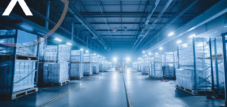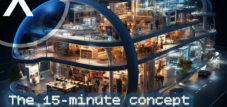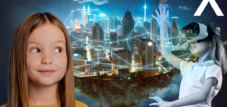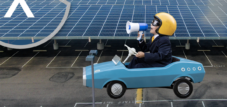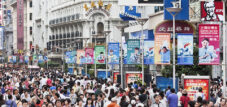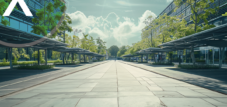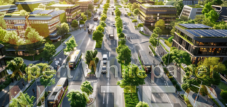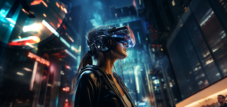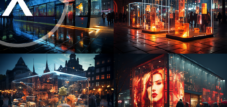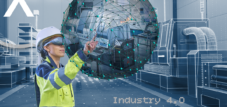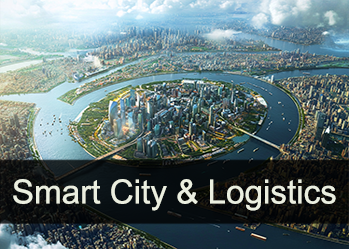The Smart City Factory for the city and industry: PV, AI, 5G, warehouse logistics, digitalization and metaverse – all from one Xpert.Digital source
Language selection 📢
Published on: June 27, 2024 / Update from: June 27, 2024 - Author: Konrad Wolfenstein
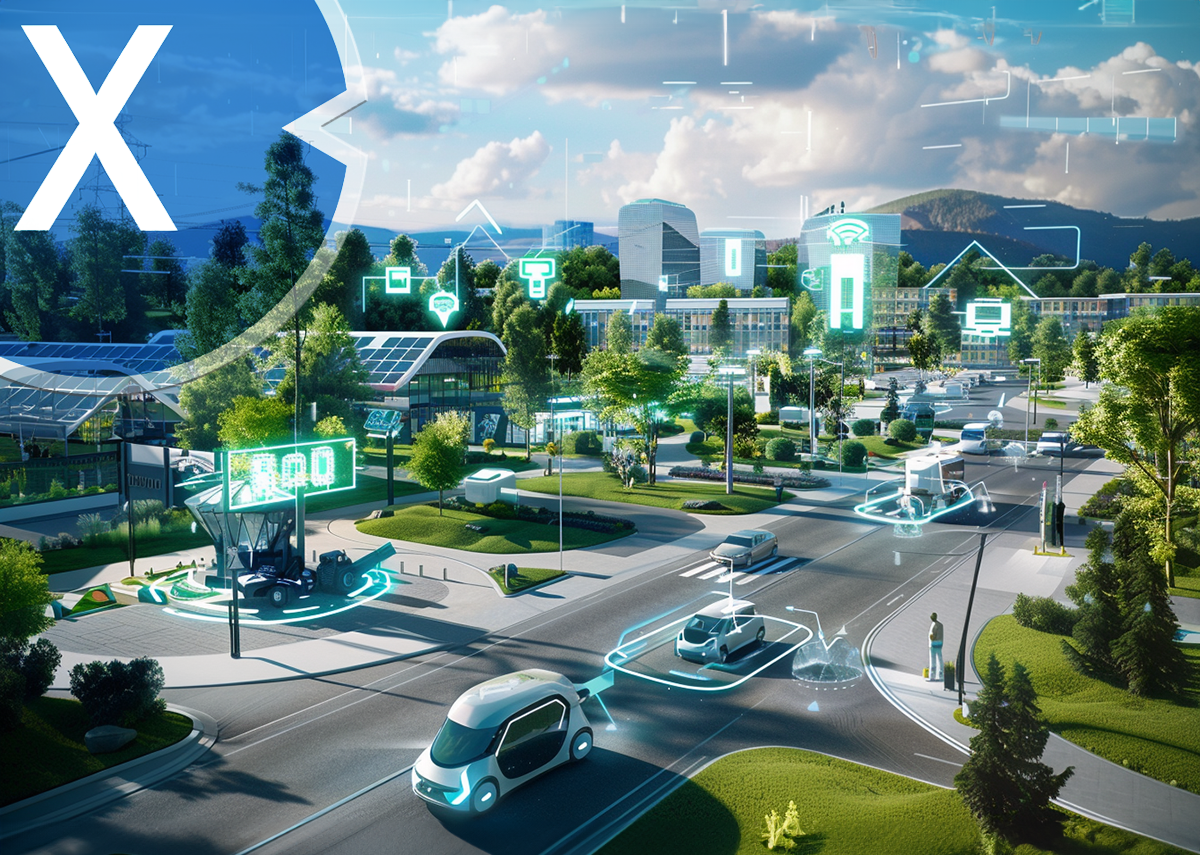
The future of the Smart City and Smart Factory: Integration solutions for urban and industrial spaces - Image: Xpert.Digital
🌳🏢🔍 Future-proof urbanization and modern industry 🌞🤖📶
🌆🏭 Shaping the future: Smart City and Smart Factory solutions
The Smart City and Smart Factory concepts offer comprehensive solutions for advancing urbanization and modern industry. Photovoltaics (PV), artificial intelligence (AI), 5G technology, warehouse logistics, digitalization and the metaverse are used to make our cities and industrial worlds future-proof and efficient. Xpert.Digital combines all of these technologies and offers comprehensive solutions.
Xpert.Digital is one of the pioneers in the areas of urbanization and urban logistics solutions as well as in the segments of logistics, intralogistics, digitalization, renewable energies and smart 3D visualizations. Thanks to the continuous expansion of our specialist skills, we have firmly established ourselves as leading experts for smart cities and smart factories. On our platform, the industry hub Xpert.Digital and e.Xpert Infotainment Portal , you will find over 2,500 specialist articles and more than 400 PDFs with numbers, data and facts to provide you with well-founded and comprehensive information.
Seamlessly integrating all of these technologies makes it possible to collect, analyze and respond to data in real time. Mobility is becoming more efficient, the energy supply is becoming more sustainable and urban life is becoming more livable overall. These Smart City Factory concepts exemplify the changes that will shape our cities and industries now and in the future.
📶🛠️ Power grid and radio network infrastructure
The basic requirement for a smart city and smart factory is reliable wireless network coverage. Given the importance of real-time data and real-time tracking, 5G technology (including 5G campus networks ) plays a significant role. This technology is essential to implement different variants of the metaverse such as city, consumer and industrial metaverses. These smart 3D worlds and digital twins require a powerful network infrastructure.
Electricity is the lifeline of any modern infrastructure. In the context of sustainability and energy efficiency, solar energy plays a prominent role. Photovoltaics have proven to be effective, efficient and easy to integrate, particularly in urban areas. In addition to generating electricity, solar systems also offer additional advantages:
1. Solar systems and PV roofing on asphalt surfaces
These help to reduce urban heat islands
2. Dual use of space
For example, through solar parking spaces or PV carports both in inner cities and in industrial areas.
3. Partially transparent solar modules
These can be integrated into city solar pergolas , for example, which enables greenery underneath and thus contributes to the quality of life.
4. Building-integrated photovoltaics
There is also the option of using building-integrated photovoltaics This integration contributes to sustainable urban development.
5. Facade solar
An alternative to building-integrated photovoltaics is the solar facade , which can be attached to the outside of buildings. Particularly interesting for large halls and building complexes.
6. Other alternatives: From roof to flat roof solar systems, open space solar parks, solar fences and Agri-PV
These options offer a variety of ways to effectively use solar energy in different environments. Whether on the roof of a building, in open spaces, as part of infrastructure projects or in combination with agricultural activities - there are suitable solutions for every situation.
🧠 Artificial intelligence
With the increasing integration of renewable energies, AI is becoming increasingly important for controlling these complex energy systems ( smart grid ). While conventional power grids are usually characterized by centralized power generation, the trend is shifting towards decentralized generation systems. Renewable sources such as photovoltaics, wind power and biogas contribute to a more complex structure. This presents new challenges, particularly in the areas of load control, voltage maintenance and grid stability. Decentralized generation systems feed directly into the lower voltage levels, which requires intelligent control.
An intelligent power grid integrates all players – from producers through storage and network management to consumers. This ensures that exactly as much energy is always produced as is consumed. Intelligent networks take decentralized energy sources and storage into account, which leads to spatially and temporally balanced consumption. This is particularly important to compensate for the fluctuations in energy production from renewable sources.
🌐 Digitalization and automation
Digitalization is a continuous process that has revolutionized the way we live and work. With the introduction of the Internet in the late 20th century, the availability of information changed, enabling global business strategies and methods such as “just-in-time” production. Over the last two decades, mobile technologies, social networks and AI have further accelerated this change. These technologies allow deeper networking, automation and the analysis of huge amounts of data.
In the field of logistics, the introduction of the bar code in the 1970s laid the foundation for global trade. Since then, logistics has evolved through increasing flexibility and automation, but this has also led to more complex processes. From 2027, the barcode will be replaced by the 2D matrix code , which can contain more data and be used multifunctionally. This code can not only be used in global and internal logistics, but also provide additional information for users and end consumers, including smart 3D visualizations that can be viewed with smartphones. These visualizations could also be integrated into a metaverse.
🌍 Metaverse and the 15-minute city concept
For urbanization, the metaverse will play a central role in daily life. Be it for work, shopping, education, healthcare or culture – all of these activities should be reachable within a 15-minute walk or cycle path. This neighborhood planning promotes the development of mixed neighborhoods that integrate both housing and commercial, cultural and recreational functions. The aim is to reduce long commutes and promote social cohesion and a connected community.
In the 1 5-minute city, particular emphasis is placed on promoting emission-free or low-emission forms of mobility. Cities should be planned to minimize the need for private vehicles to reduce traffic congestion, air pollution and noise pollution. Pedestrian and bicycle paths will form the backbone of the urban transport network, complemented by reliable public transport as a sustainable alternative to individual motorized transport.
If this cannot be implemented immediately for various reasons, the Metaverse offers the opportunity to close this gap. For example, administrative procedures could be completed virtually from the living room.
🏭 Industrial Metaverse – The step towards Industry 4.0
The Industrial Metaverse includes real-time data tracking, predictive maintenance technologies, rapid machine changeovers and virtual level testing through the use of digital twins. This enables the simulation of entire production systems, which leads to increased efficiency and flexibility.
🚚 City logistics and rural supply
City logistics and rural supply benefit significantly from Smart City Factory technologies through the use of autonomous robotics and cobots as well as fully automated high-bay warehouses and micro-hubs . Local to decentralized logistics centers that use renewable energies and AI can create efficient and sustainable supply structures. These technologies enable real-time data collection, analysis and response, resulting in more efficient mobility, sustainable energy supply and an overall improved quality of life in urban areas.
🎯🎯🎯 Benefit from Xpert.Digital's extensive, fivefold expertise in a comprehensive service package | R&D, XR, PR & SEM

AI & XR 3D Rendering Machine: Fivefold expertise from Xpert.Digital in a comprehensive service package, R&D XR, PR & SEM - Image: Xpert.Digital
Xpert.Digital has in-depth knowledge of various industries. This allows us to develop tailor-made strategies that are tailored precisely to the requirements and challenges of your specific market segment. By continually analyzing market trends and following industry developments, we can act with foresight and offer innovative solutions. Through the combination of experience and knowledge, we generate added value and give our customers a decisive competitive advantage.
More about it here:
📌 Other suitable topics
🌆🏭 The future of the smart city and smart factory: integration solutions for urban and industrial spaces
📦 Advances in warehouse logistics through smart factory technologies
The modern technologies of the Smart Factory are revolutionizing warehouse logistics significantly. With advanced sensing and tracking solutions, inventory can be monitored and managed in real time. This leads to a reduction in storage costs and an increase in efficiency. Intelligent warehouse management systems, supported by AI, predict requirements and continuously optimize warehouse processes.
📶 5G integration: opportunities and challenges
The integration of 5G into urban and industrial environments opens up numerous opportunities, but also presents some challenges. 5G allows massive amounts of data to be transmitted quickly and reliably, which is essential for the industrial metaverse and digital twins. The challenge, however, is to build the necessary infrastructure across the board and take security aspects into account.
🏙️ The importance of 5G for the smart city
In smart cities, 5G enables faster and more networked structuring of urban and industrial processes. Applications such as connected traffic control systems, smart energy distribution and real-time monitoring of urban environments benefit significantly from the increased bandwidth and low latency that 5G offers.
🧠 Use of artificial intelligence (AI) for city services
AI plays a crucial role in improving city services. By analyzing large amounts of data, urban utilities can work more efficiently, optimize traffic flows and improve security services. AI-driven systems help cities take proactive and predictive actions.
🌐 Digitalization in urban infrastructures
Digitalization is at the heart of modern urban infrastructure. From intelligent transport systems to digital health solutions to smart energy and water networks – digital transformation enables increased efficiency and sustainability.
🌌 The Metaverse and its role in future urban development
The Metaverse offers new dimensions for urban development. Virtual and augmented realities can be used for urban planning, architecture and real estate shows. Digital twins of urban spaces enable more accurate planning and management by providing virtual replicas of real environments.
🚚 Smart warehouse logistics: From theory to practice in the smart factory
In the Smart Factory, theory becomes practice through the use of technologies from the Industrial Metaverse. These enable comprehensive networking and digitalization of warehouse processes. Real-time tracking, autonomous transport systems and predictive analytics make warehouse logistics more efficient and reliable.
🤖 Artificial intelligence as a driver for smart cities and industries
AI is a main driver of the transformation towards smart cities and industries. Machine learning and complex algorithms automate and optimize processes. In urban and industrial contexts, this leads to a significant increase in productivity and innovation.
💡 The future of digitalization: changes through the Smart City Factory
The Smart City Factory is at the center of the digital revolution and is fundamentally changing urban and industrial spaces. The comprehensive integration of 5G, AI, sensors and the metaverse increases efficiency, sustainability and quality of life. Competition and market shares are secured through early and targeted implementation of these technologies.
The Smart City Factory combines all of these technologies and approaches into a coherent and integrated solution that helps cities and industries prepare for the challenges and opportunities of tomorrow.
📣 Similar topics
- 🏭 Advances in warehouse logistics through smart factory technologies
- 📶 5G integration: opportunities and challenges
- 🏙️ The importance of 5G for the smart city
- 🧩 Use of artificial intelligence (AI) for city services
- 📊 Digitalization in urban infrastructures: A comprehensive overview
- 🌐 The Metaverse and its role in future urban development
- 🚚 Smart warehouse logistics: From theory to practice in the smart factory
- 🤖 Artificial intelligence as a driver for smart cities and industries
- 🔮 The future of digitalization: changes through the Smart City Factory
- 🔧 Technological innovations for sustainable urban development
#️⃣ Hashtags: #SmartCity #SmartFactory #Digitalization #AI #5G
We are there for you - advice - planning - implementation - project management
☑️ Industry expert, here with his own Xpert.Digital industry hub with over 2,500 specialist articles
I would be happy to serve as your personal advisor.
You can contact me by filling out the contact form below or simply call me on +49 89 89 674 804 (Munich) .
I'm looking forward to our joint project.
Xpert.Digital - Konrad Wolfenstein
Xpert.Digital is a hub for industry with a focus on digitalization, mechanical engineering, logistics/intralogistics and photovoltaics.
With our 360° business development solution, we support well-known companies from new business to after sales.
Market intelligence, smarketing, marketing automation, content development, PR, mail campaigns, personalized social media and lead nurturing are part of our digital tools.
You can find out more at: www.xpert.digital - www.xpert.solar - www.xpert.plus




